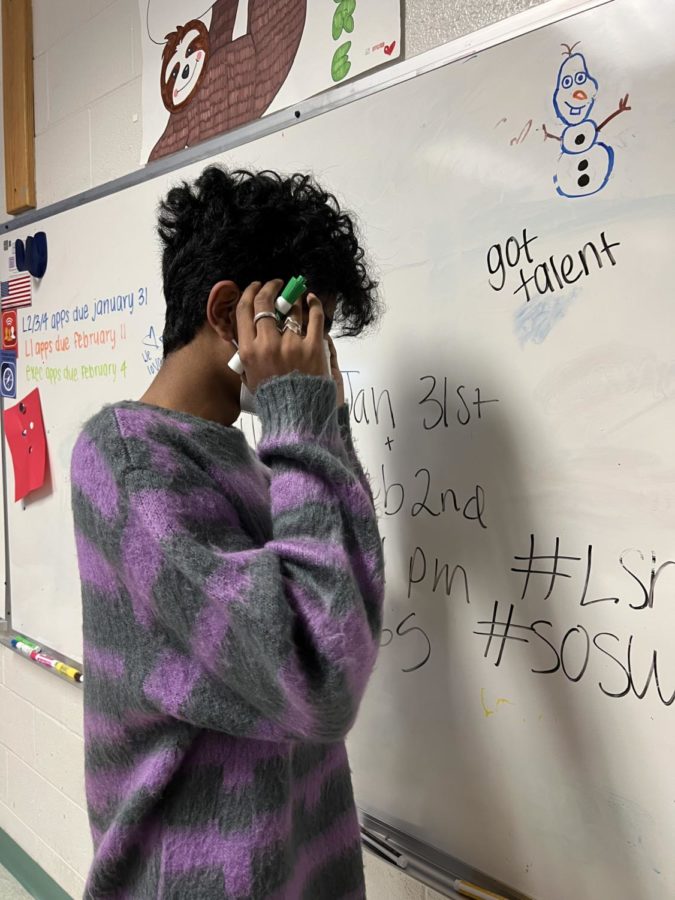Burnout in academia causes stress, demotivation
February 3, 2022
A straight-A student on the varsity swim team who tutors kids in their free time has been labeled as a gifted child ever since she was young. They work hard from ninth to eleventh grade to get into their top college, but start to feel burnout in their final year of high school. They lose interest in the activities they once had a passion for and their grades start to drop. This is one of the numerous scenarios of academic burnout.
According to WebMD, some signs of stress that contribute to this burnout are dropping grades, stomachaches, trouble sleeping and changes in eating habits. Stress has been proven to take away the energy that teens need to focus and make good decisions, and distract them from their priorities. This could lead to unhealthy habits which could negatively affect their future.
According to the University of the People, academic burnout is the result of weeks or months of studying the same material, working on the same project or even years of schooling. This could result in exhaustion, frustration, lack of motivation and reduced ability in school.
“Students experience burnout because of a combination of pressure, relentless academic curriculum and lack of allotment on time, especially if they do sports,” senior Ethan Bowman said. “It’s an issue because the emotional distress caused by this burnout can affect not only the life of the individual but all those around them.”
Chantilly offers numerous Advanced Placement (AP), Dual Enrollment (DE) and other general courses with a lot of work such as pre-calculus/calculus. Many students take such AP and honor courses to get a GPA boost but may put extreme pressure on themselves. According to Best Colleges, AP and DE courses offer advanced academic content and a faster curriculum, which requires more study time and homework compared to most standard and honor classes. Colleges also look at course rigor, because college curriculum is more arduous and demanding than in high school. According to CollegeRaptor, this demonstrates that one should be able to manage more difficult material, which assures universities that they will work just as hard in their classes.
Advanced classes can help with preparation for the desired field, but taking a heavy course load may not be necessary for success and may even cause the opposite.
“The rigor of a certain class definitely impacts a student’s academic burnout,” sophomore Siddhi Surawkar said. “Some classes just have a lot of work or they’re difficult to understand and that means the student has to put in a lot more effort, which can get tiring.”
According to MentorEducation, helping students recognize their and others’ stress allows them the ability to deal with stressful situations better. Fostering a relationship with teachers and counselors has proven to help their student’s mental health and promote a safe environment at school.
“Teachers can help academic burnout by providing a calendar of dates of assessments and assignments,” senior Krishan Bhamidipati said. “If students know when assignments are taught or due, they can do work in their free time.”
A tip to reduce this burnout is to do research before taking a course. To decide whether to take a class, one could get advice from upperclassmen and research the class content/syllabus. While deciding on your next year’s schedule, one should be aware of the required courses a student needs to take in order to graduate. According to PrepScholar, it is also important to base your schedule on your own personal strengths and passion. For example, if someone is interested in computer science, they should consider taking Cyber Security and Programming.
Some tips that can be done to minimize this burnout are to prioritize responsibilities and scheduling downtime. According to Entrepreneur, one should take a close look at their time and not put their energy into wrong areas, and instead focus on putting one’s energy into areas that are meaningful and productive. According to HealthEssentials, scheduling downtime has proven to improve one’s mood and boost productivity. This also enhances concentration as it allows one to take a step back and clear your mind which provides an easier transition back into the task.
According to Verywell Mind, while a mental health day will not fix the underlying issues that contribute to burnout, it will provide a much-needed respite to halt, regroup and return with more energy and a fresh viewpoint. According to ABC7, a Virginia state law was passed in 2021 which allows students to be exempt from school due to mental health reasons. This will assist in reducing the stigma attached to mental health and mental illness. Many health experts state that parents, students and schools should promote kids’ mental well-being and self-care.
“The advice I would give to a student who is burned out is that it will pass,” Bowman said. “Take some time off and communicate with your teachers and try to create an organization that will prevent future burnouts.”



